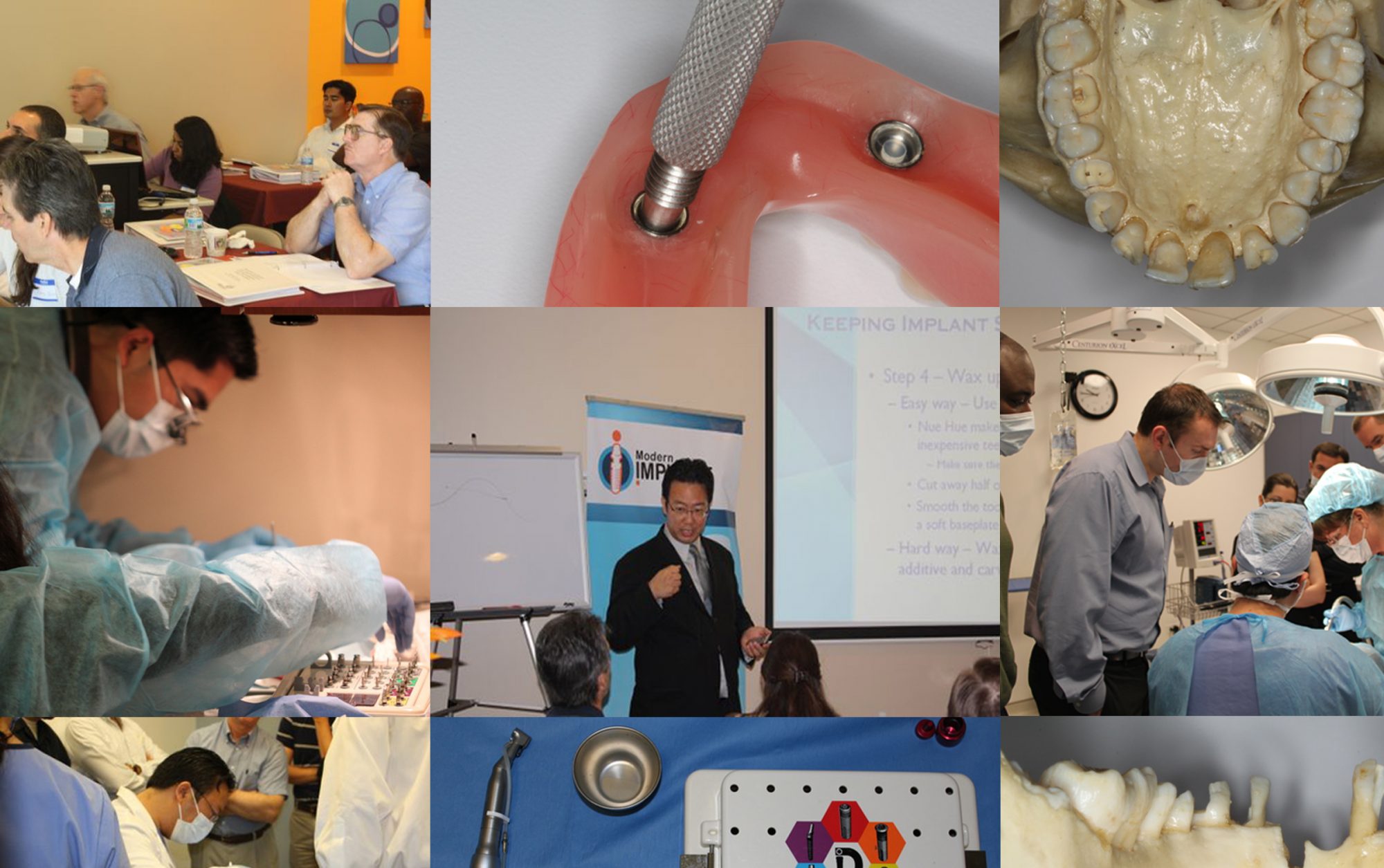Below are some common questions that we have been asked.
Modern Implantology for the General Practitioner
- Can you give some more info on how we can place implants under supervision at your location upon completion of the course? Can you give me a ballpark estimate on what additional fees would be for this?
During the course, I will be inspecting the hands on models and pig jaws to determine if the participant’s hand skills are adequate. There will be other specific requirements such as proper case selection. Specific details will be given at the course.
Participants will be responsible for approximately 50% of my normal fees, but it is expected that your patients will pay for this. Up to date fees can be found here. For example, I charge roughly $2500 for a single fixture and $600 for the first hour of IV sedation. You would pay me $1250 for the implant supervision and $300 for the sedation. All supervised procedures will be performed at one of our offices. The implant fee includes one fixture and one healing abutment, up to $200 in value. You are welcome to bill the patient your regular fee. I have found that it is far more cost effective to have the patient pay for a discounted procedure, rather than flying far away and pay to place implants on people you don’t know to the tune of over $1000 for each fixture. These courses also tend to lack any meaningful follow up for the implants you placed, which raises serious ethical and moral issues.
- What kind of support do you offer after completion of the course? Will we be able to contact you to help with treatment planning future cases?
After the course, I encourage you contact me for any case you are treatment planning. Of course, I expect you to present me with your opinion and treatment plan prior to offering my perspective. This is the best way for your treatment planning and clinical skills to improve.
- If I understand correctly, this first course will discuss placing implants in the mandible. Are there future plans to offer courses in bone grafting, maxillary implants, sinus augmentation, etc?
Both the placement and restoration of implants in lower anterior and all posterior locations will be covered. However, I always try to find cases in the mandible as it is easier to capture on video. Intermediate topics will cover the most common grafting and implant techniques that are not straightforward, that you will encounter in your practice. Advanced topics will involve in depth didactic and hands on training to help participants feel comfortable with more complex techniques.
- I am contemplating between your course and the Misch Institute. Misch is quite a bit more expensive and not located here in Chicago. Could you comment on the advantages/disadvantages of your course compared to Misch?
The Misch Institute offers a much more comprehensive course than ours. However, it is in another state, and it is very expensive. I created this course to offer midwest GP’s, and specifically Illinois dentists to learn how to confidently place and restore implants in the most common areas of the mouth. I know other dentists who have attended continuums and still haven’t placed a single fixture. My course is designed to make sure you have the greatest likelihood of placing an implant within a month of the course.
Disadvantages – Not comprehensive for all case types and advanced concepts are not going to be presented.
Advantages – Designed to have participants start placing implants as soon as possible, offer chairside mentoring and sedation for your patients, relatively inexpensive, post course treatment planning and systems support, close to Northern Illinois dentists.
By following up with the intermediate and advanced courses, you will gain a firm grasp of comprehensive implant dentistry.
- Is your course specific to a particular brand of implant or does is teach implant dentistry that is compatible with common implant brands?
The course is presented using various implant surgical systems and restorative components. Attention will be paid to the pros and cons of various implant designs, and the concepts presented are definitely applicable to most brands of implants.
After taking the basic course, you should feel comfortable with most tapered, threaded implant systems.
- Will your Intermediate and Advanced Courses offer live patient segments?
The Intermediate Course will focus on model exercises for the hands on portions. The reason for this is that having the right “feel” is just as important as knowing the technique itself. Also, there are too many topics within the Intermediate Course to have live patients participate. Most participants have found the hands on to provide adequate preparation for their properly selected patients.
The Advanced Courses will involve live patients for the sinus lift, as well as, the bone block and guided bone regeneration topics. The full arch implant surgery and restoration topic will not involve live patients.
- Could you discuss your educational background/experience in implant dentistry?
I graduated from the University of Michigan School of Dentistry in 2001. I have been placing and restoring implants since 2002. I began my journey with the 3i surgical course in Florida. Since then, the significant courses I have attended include: Nobel Biocare’s Surgical and Restorative course, Steve Wallace’s Sinus Lift course, Sacha Jovanovich’s Advanced Implant Therapy course, multiple ICOI and AO conventions, Phillipe LeClerq’s Immediately Loaded Prosthetics course in Paris, France, and most recently, Hilt Tatum’s Journey to Remember course in Normandy, France. Since 2009, I have had the pleasure of teaching over 1500 dentists and specialists in Illinois, Michigan, Georgia, and Tennessee, implant surgery and prosthetics, and even more in study clubs and advanced topic courses.
At this point in my career, I am focusing on implant surgical procedures. Our offices routinely perform large augmentations and full arch cases. Through our courses, one of my goals is to help other dentists avoid the mistakes that I made early in my implant journey.

